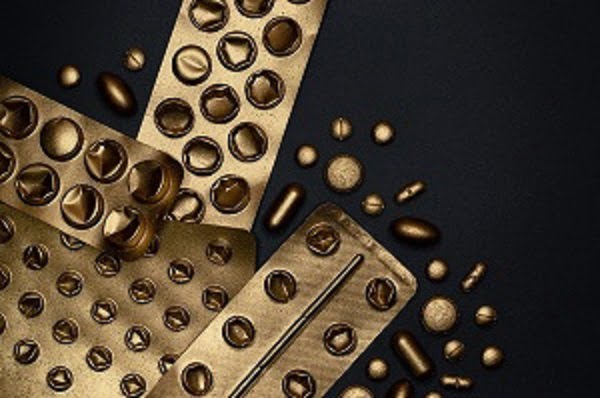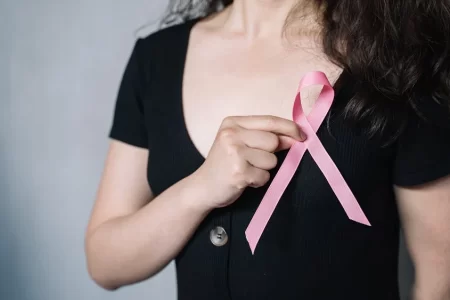Hormone Therapy for Breast Cancer
- Updated on: Jul 29, 2024
- 4 min Read
- Published on Nov 17, 2020

Hormone Therapy for Breast Cancer
Hormone therapy refers to a systemic treatment that is given to hormone-sensitive patients. Hormone therapy is also known as estrogen therapy or combinational estrogen /progesterone treatment. The therapy targets cancer cells almost anywhere in the body but mainly breast cancer cells. Hormone therapy for breast cancer prevents hormones from attaching to cancer and reduces hormones in the body.
One of the common types of breast cancers is Hormone Receptor-Positive Breast Cancer, where excessive production of hormones, estrogen and progesterone might lead to cancer. Adjuvant hormonal therapy is provided to the patient to reduce the hormone levels in the body. Also, in some cases, the production of these hormones is completely blocked. The hormones do not reach the cancer cells, and this inhibits the growth of cancer.
In some cases, the risk of breast cancer is elevated by the hormone- estrogen. When estrogen helps cancer to grow, hormone therapy is recommended as a treatment for it. Estrogen-elevated type of breast cancer is known as Estrogen Receptor-Positive (ER+) Breast Cancer. Hormonal breast cancer therapy helps to shrink the tumors to reduce the chances of surgery.
Hormone therapy is also known by other names like hormonal therapy or endocrine therapy. The tumors are tested to be hormone-dependent by tissue sampling. When the tumor cells are found to have estrogen receptors, then the cancer is called Estrogen Receptor-Positive Breast Cancer (ER-positive breast cancer), Estrogen-Sensitive, or Estrogen-Responsive. Similarly, when the tumor cells have progesterone receptors, the cancer is supposed to be Progesterone Receptor-Positive (PR or PgR positive) breast cancer.
About 75% of breast cancers are found to be Estrogen Receptor-Positive. Breast tumors that contain estrogen and progesterone receptors are sometimes called hormone receptor-positive (HR-positive) breast cancers.
Hormonal Therapy Is Not HRT
Hormonal Therapy works against hormone-receptor-positive breast cancer. It should not be mistaken with hormone replacement therapy (HRT). HRT is not appropriate for breast cancer treatment. HRT is also considered relatively unsafe for the diagnosis of breast cancer in some women.
Read About What is Breast Cancer (Female)?
When Is Hormone Therapy Recommended To the Patient?
Estrogen therapy is often used as adjuvant therapy after surgical procedures to reduce any chance of cancer from coming back. In cases, if adjuvant therapy is given before surgery, then it is known as neo-adjuvant therapy. Hormone therapy helps treat recurrent breast cancer or cancer that has metastasized to distant parts of the body.
Women with Hormone Receptor-Positive (ER-positive and PR-positive) breast cancers are recommended with hormonal therapy with the following goals:
- Lower the risk of breast cancer re-occurrence (after surgery).
- Reducing the size of the tumor (for easy removal during surgery).
- Treating recurrent cancer.
Hormonal Breast Cancer Survival Rate
When a woman with the major subtypes of breast cancer such as ER-positive or Hormone receptor-Positive Breast Cancer, is treated, she can expect a normal healthy life in very early-stage breast cancers of any subtype.
Hormonal breast cancer survival rate is calculated on the basis of the number of people living for a defined tenure (5-year or 10-year) after hormone therapy:
The 5-year survival rates after hormone therapy provided by the American Cancer Society are:
- Chances of survival after hormone therapy for breast cancer stage 0: 99% approximately
- Chances of survival after hormone therapy for breast cancer stage 1: 99% approximately
- Chances of survival after hormone therapy for breast cancer stage 2: 95% approximately
- Chances of survival after hormone therapy for breast cancer stage 3: 70% approximately
- Chances of survival after hormone therapy for breast cancer stage 4 (the metastatic stage): 20% approximately
Treatment of Breast Cancer With Hormone Therapy
Hormone therapy for breast cancer works in two ways: either lowering the estrogen levels or blocking the estrogen from acting on breast cancer cells.
Treatments That Lower Estrogen Levels or Inhibit Estrogen Production
Lowering or blocking the estrogen level can help slow down the growth of cancer and prevent the recurrence of breast cancer. This is done with the help of:
- Aromatase inhibitors (AIs): Aromatase inhibitors (AIs) help in lowering estrogen production.
3 known aromatase inhibitors work best in treating breast cancer:
- Letrozole (Femara)
- Anastrozole (Arimidex)
- Exemestane (Aromasin)
Although in some cases, muscle pain and joint stiffness or pain might be felt.
Ovarian suppression involves removing or shutting down of ovaries (ovarian suppression) to inhibit estrogen production. Ovarian suppression uses some drugs or surgery to stop producing estrogen.
Following are the ways to remove or shut down the ovaries :
Oophorectomy: Surgical removal of ovaries is called oophorectomy. It is a form of permanent ovarian ablation.
Luteinizing Hormone-Releasing Hormone (LHRH) Analogs: LHRH drugs are more commonly used because these analogs inhibit the body’s signal to the ovaries, leading to menopause temporarily. Some common LHRH drugs are goserelin, leuprolide, etc.
These methods also lead to uneasy problems such as hot flashes, night sweats, depression, dryness in the vagina, and mood swings.
Read What to Expect at a Breast Clinic Appointment?
Drugs That Help To Block Estrogen Receptors
The most commonly used hormone therapy drugs to treat breast cancer are:
- Tamoxifen (Nolvadex, Soltamox)
- Aromatase inhibitors (anastrozole, exemestane and letrozole)
- Goserelin (Zoladex)
- Fulvestrant (Faslodex)
- Abemaciclib (Verzenio)
- Letrozole (Femara)
- Megestrol (Megace)
- Palbociclib (Ibrance)
- Toremifene (Fareston)
If breast cancer has spread to distant parts of the body, then hormone therapy for breast cancer is supposedly an efficient method of controlling it. Drug therapy for hormonal breast cancer is always preferred before surgical methods.
Pros and Cons of Hormone Therapy for Breast Cancer
Hormonal therapy has the advantage of blocking the ability of breast cells not to receive hormones that are responsible for inhibiting the growth of breast cancer cells from avoiding the recurrence of breast cancer.
Hormone therapy following surgery, radiation, or chemotherapy has proven to reduce breast cancer recurrence risk during early-stage hormone-sensitive breast cancers.
Hormone Therapy for Breast Cancer Side Effects
The side effects of hormone therapy are dependent on the drug’s specificity or the type of treatment. Some common side effects of a few drugs listed below:
Tamoxifen: Risk of blood clots (especially in the lungs and legs), stroke, mood swings, depression, Cataract, endometrial and uterine cancers
Raloxifene: Risk of blood clots, especially in the lungs and legs, stroke in certain subgroups
Ovarian suppression: Bone loss, mood swings, depression, and loss of libido
Aromatase inhibitors: Chances of heart attack, angina, heart failure, hypercholesterolemia, joint pain, depression, or mood swings.
Fulvestrant: Gastrointestinal symptoms, loss of strength, pain, etc.
Other Side Effects: Other side effects of hormone therapy are hot flashes, night sweats, and vaginal dryness. It also disrupts the menstrual cycle in some premenopausal women.











